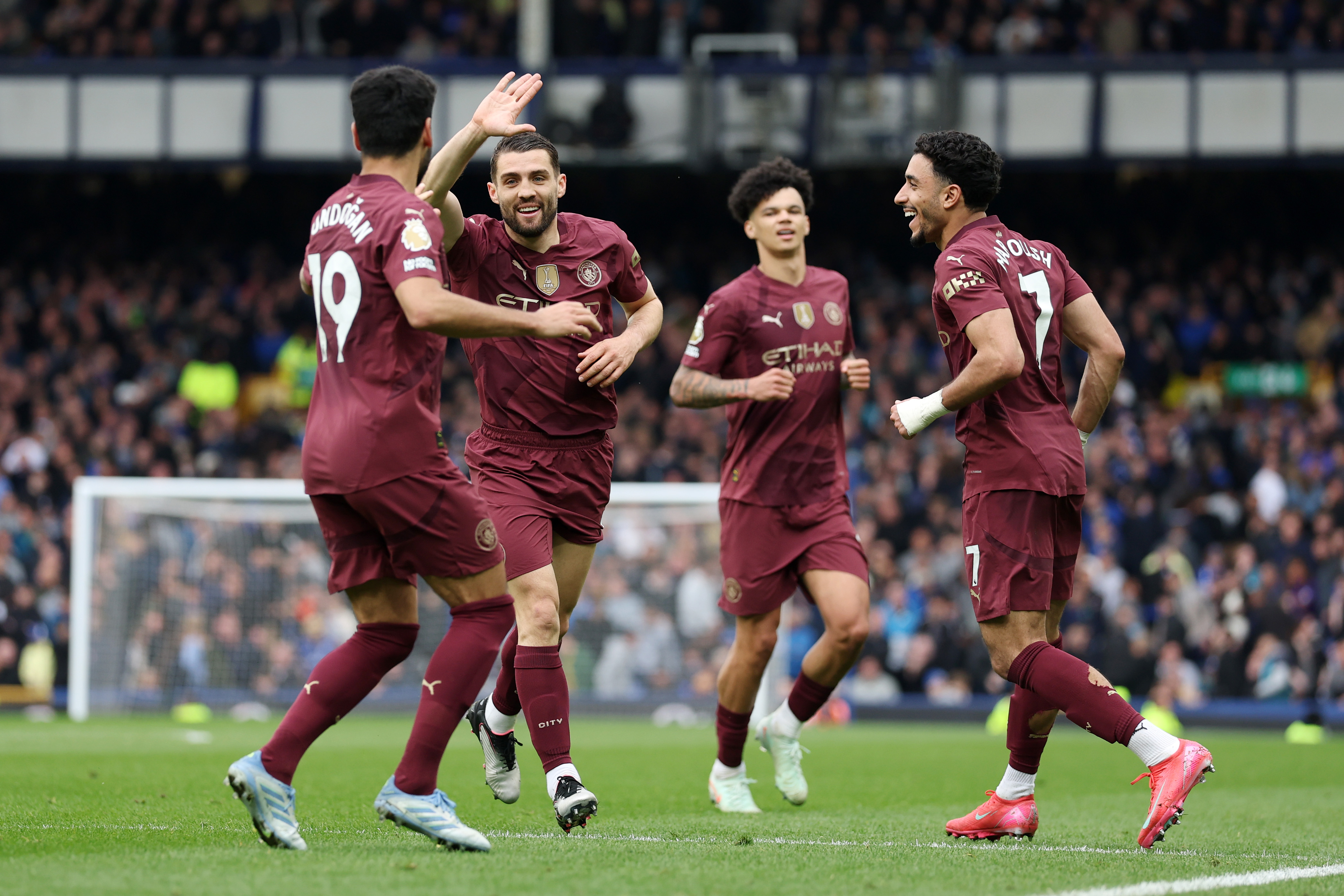Cristiano Ronaldo: The making of a legend – and how he returned to Manchester United to win it all again
Cristiano Ronaldo's return to Manchester United was one of the stories of 2021 – and it's just one unexpected turn in a blockbuster career of trophies and tribulations
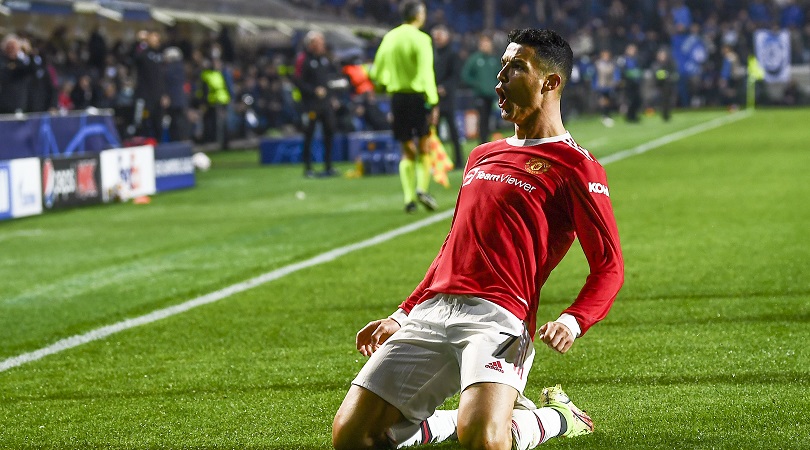
This piece originally appeared in Issue 331 of FFT – buy it now!
Cristiano Ronaldo took a deep breath, steadied himself, then fired the free-kick towards goal. He was 25 yards out, but his low effort arrowed past Shay Given into the net. His 118th and final goal for Manchester United had arrived at home to Manchester City, to all but seal a third straight Premier League title for the Red Devils.
The reigning European champions had also just reached a second successive Champions League final, courtesy of Ronaldo’s blistering Emirates brace against Arsenal five days earlier. City were trudging to 10th place in the top flight – they’d not finished above their rivals for 18 years, going back to 1991. They’d never even been close.
United’s dominance was total, and CR7 was officially the planet’s best footballer – the only person ever to win the FIFA World Player of the Year award while plying his trade on English soil. “I’m the first, second and third best player in the world,” he declared back then, with typical modesty. He’s won the award four more times since, on the way to four more Champions League titles, and 551 goals in 572 games for Real Madrid and Juventus.
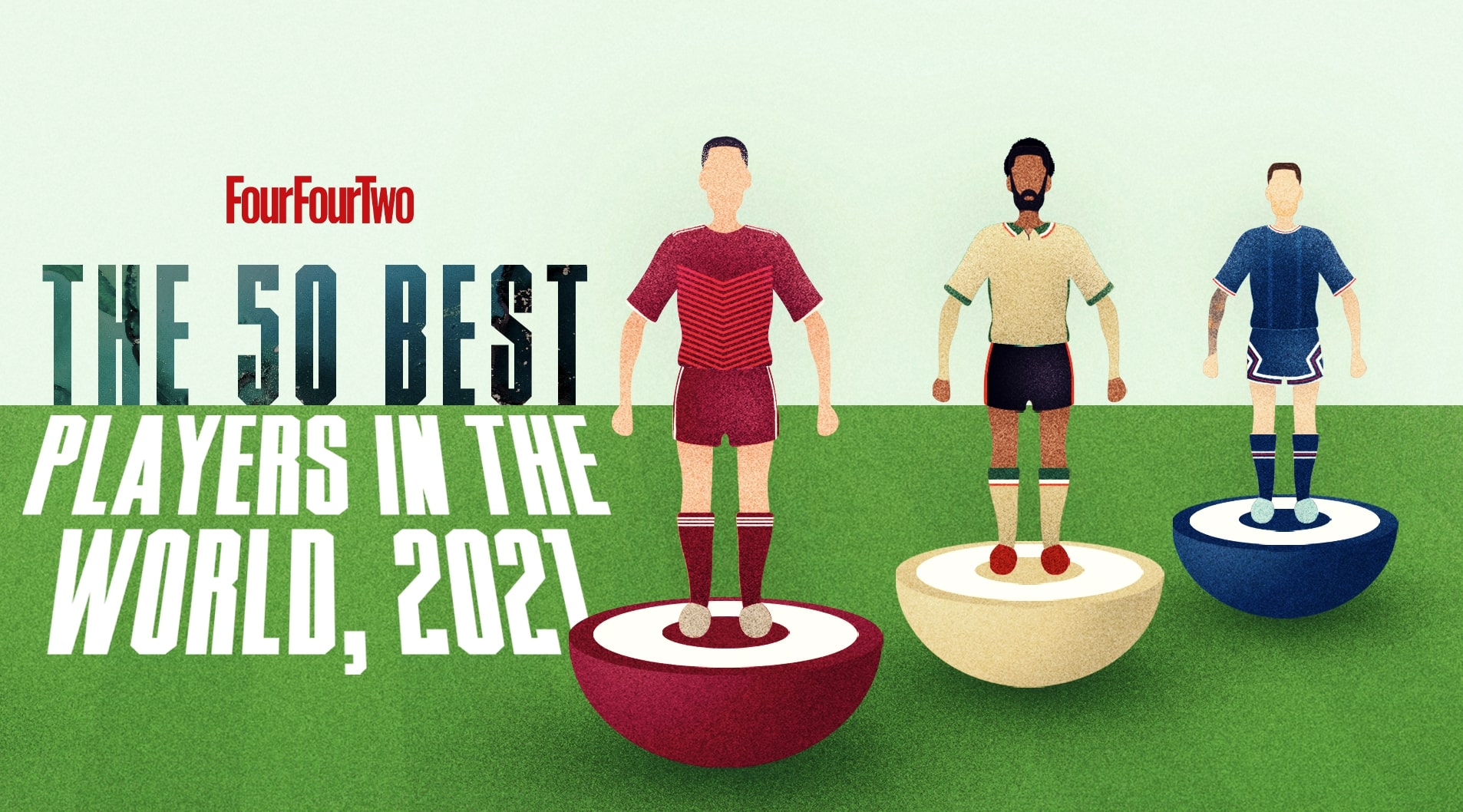
During 12 years away from Old Trafford, though, the balance of power has shifted, almost definitively. Since Sir Alex Ferguson’s retirement in 2013, United have finished below City for eight consecutive seasons. Had Ronaldo moved to the Etihad this summer, the humiliation would have been complete.
Instead, the Portuguese followed his heart and diverted to Old Trafford, in a bid to bring back the glory days. City thought they were gaining a striker – instead they have gained an enemy more powerful and determined than anything they’ve faced in Manchester for quite some time. Ronaldo has returned… and he wants his Premier League title back.
Move over, Ole
Ronaldo might never have won a Premier League title at all. The 21-year-old had decided to leave Old Trafford that summer, before his manager travelled to Vale do Lobo on the Algarve for a monumental meeting.
Get FourFourTwo Newsletter
The best features, fun and footballing quizzes, straight to your inbox every week.
“You’re one of the bravest players to come to Manchester United – walking away isn’t courage,” Ferguson told his young charge.
It was Ferguson who’d decided Ronaldo should have the No.7 shirt when he arrived at United – the Portuguese prodigy asked for 28, the jersey he wore at Sporting, but CR7 quickly dazzled in his new number. “He almost retired me,” Ole Gunnar Solskjaer joked recently, recalling how they’d played on opposite wings when Ronaldo made his first start for the club at home to Wolves in August 2003. The teenager’s tendency to swap flanks mid-match meant Solskjaer had to keep doing the same, putting extra strain on a knee problem he’d been struggling with. The Norwegian missed most of the next two years through injury and was never quite the same player again.
Despite his obvious talent, Ronaldo’s first three years at United delivered no league titles. The Red Devils didn’t progress beyond the last 16 of the Champions League: even crashing out in the group stage in 2005/06 after defeat against Benfica, when Ronaldo earned a ban for directing a middle-finger gesture at heckling home fans ‘welcoming’ the winger back to Lisbon.
His relationship with Ruud van Nistelrooy had also been difficult – the Dutchman grew frustrated at the wideman’s lack of service, leading to a row where Ronaldo was told to go and talk to ‘his dad’, a jibe intended to reference his close relationship with United assistant Carlos Queiroz. Ronaldo burst into tears, telling Van Nistelrooy he didn’t have a dad – his father had died months earlier.
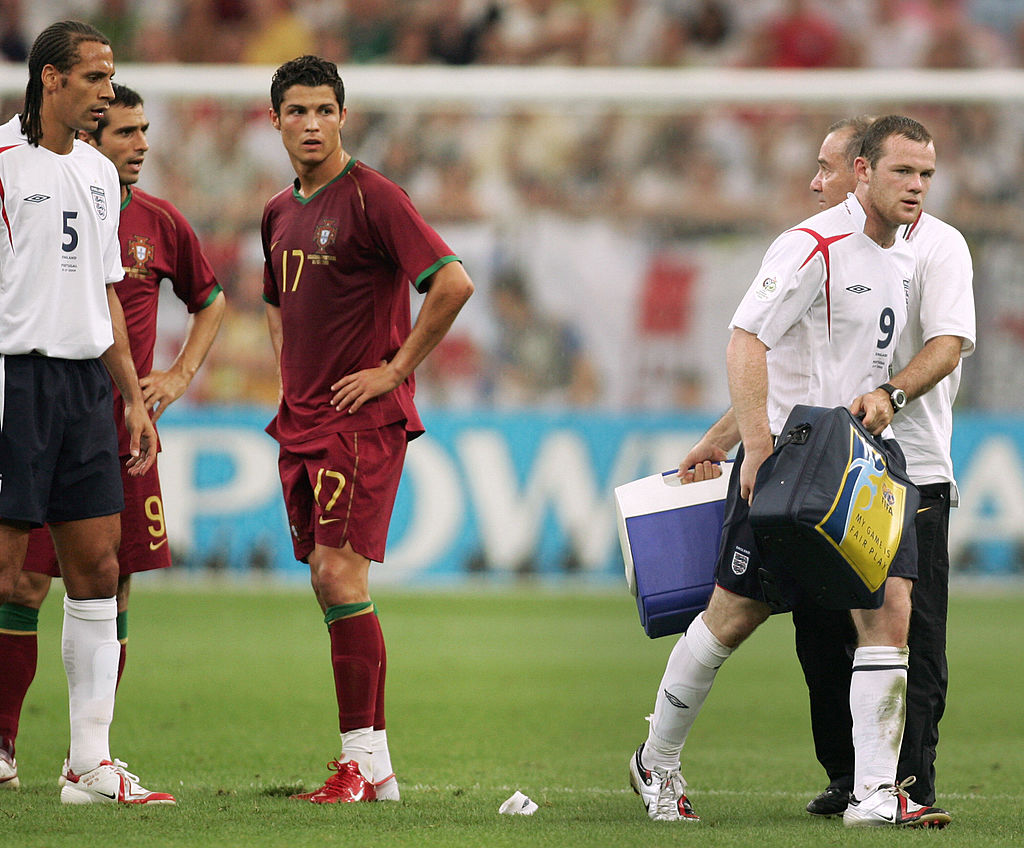
That summer, he pressed the panic button after his role in Wayne Rooney’s World Cup red card sparked vitriol from English fans and media. The Sun, never knowingly undersold, released a Ronaldo dartboard so England supporters “could get revenge on football’s biggest winker”. The bullseye was CR7’s right peeper. Obviously.
He also felt a lack of support from United. “I think I should get out of Manchester,” he admitted. “Nobody stood up for me there.”
Barcelona and Real Madrid were linked, although it’s since been claimed that he agreed a deal to join Valencia. “I had his ‘yes’ to sign him,” revealed Amedeo Carboni, then Los Che’s director of football. “We had found the financial resources to bring him in, and we had made arrangements with Nike and Coca-Cola, the player’s sponsors. I had the contracts signed by his agent Jorge Mendes – nothing was missing.”
But Ferguson changed Ronaldo’s mind. The player had been bitterly disappointed by the lack of contact from his United manager – Ferguson had actually been attempting to message Ronaldo, only to discover he’d been contacting an old number. When he finally managed to get in touch, he arranged to see Ronaldo at Vale do Lobo.
Rooney had already assured his team-mate that the World Cup incident was forgotten, offering to do a joint interview to make that clear. On the Algarve, Ferguson insisted that he wanted Ronaldo to stay, explaining how David Beckham had gone from public enemy number one to Treble winner within a year of his red card against Argentina at the 1998 World Cup. “It was exactly the same as this,” Ferguson stated to him. “They were hanging effigies of him outside pubs, he was the devil incarnate, but he had the balls to fight it. You have to get through it.”
Ronaldo decided to remain at Old Trafford. Like Beckham, he responded to the abuse by having the best season of his career so far. Like Beckham, he was second in the Ballon d’Or 12 months later. Ronaldo and Rooney combined to help the Reds thrash Fulham 5-1 on the opening day of the campaign – the former was booed at away games, but it only inspired him to new heights.
“Cristiano loved the interaction with the supporters, good or bad,” former United team-mate Louis Saha explains to FFT. “He had a strong mentality, it didn’t erode. He had a thick skin to bounce off any negativity.”
Saha had seen signs of that resilience in the early years of Ronaldo’s United career – most notably in 4-2 victory at Highbury, on a raucous February 2005 night which began with Roy Keane and Patrick Vieira’s infamous tunnel bust-up.
“Arsenal had tried to intimidate Cristiano in that game,” says the Frenchman. “He was tackled really badly by Lauren, a really mean tackle. He stood up straight away and came back. He scored after that. “I remember thinking to myself, ‘This guy is a machine, how can he be that talented?’”
With Van Nistelrooy sold in the summer of 2006, Ronaldo had the breathing space to flourish and a bet to win. Every year, CR7 and Ferguson wagered £100 on how many goals the former would score. In his first campaign, it was 10. Ronaldo lost. In 2004/05, it was raised to 15. He lost. And again in 2005/06. For 2006/07, with Ferguson having refused to take his winnings each season, Ronaldo raised the stakes to £400. He was collecting his winnings by February.
The Portuguese went on to score 23 times that season, almost double his previous best tally, and bagged his first Champions League goals in the 7-1 demolition of Roma, his 27th appearance in the competition.
By the end of 2006/07, United had won the league. Ronaldo was named PFA Player of the Year and Young Player of the Year – the first man to win both awards in the same season since Andy Gray in 1977.
"I'd rather shoot you than sell you"
Ronaldo was rapidly improving his finishing and his decision-making, after being told to study clips of the club’s legendary strikers, Solskjaer included. In 2007/08, he netted 42 goals in all competitions – 31 in the Premier League, a tally bettered only by Mo Salah in a 38-game season. It earned him the first of four career European Golden Shoes. Free-kicks had become a powerful part of Ronaldo’s armoury, thanks to his perfection of the knuckleball technique – one such stunner at home to Portsmouth earned him the BBC’s Goal of the Month award.
“There was no competition with Ronaldo on who would take the free-kicks,” pal Nani chuckles, as he talks to FFT. “If I wanted to have a little try, it would depend on his mood. I took a free-kick in one game because he let me, but didn’t get another chance after that, even though I was pretty good at them and had a technique similar to his. I teased him about it, saying I was better than him. He used to get furious – he’d only leave training after scoring five goals from free-kicks.”
Ronaldo’s competitive streak extended to more or less everything.
“We’d play tennis, ping pong, go swimming – even when we were just talking, there was some competition between us!” smiles Nani. “When I joined United, he heard I was living in a hotel at the beginning and said, ‘Why don’t you stay with me in my house?’ I spent a month there with Anderson.
“We couldn’t understand a word of English, so Ronaldo acted as translator until he got tired of it and said, ‘From now on, you have to learn it too’. The three of us were always having a laugh – Ronaldo was the same in the national team, but there was a time to fool around and a time to work. When he’s fully focused, he doesn’t like to make jokes.”
1️⃣0️⃣ years ago today, @Cristiano fired home this unstoppable free-kick... 🚀 pic.twitter.com/sXA01RtJexJanuary 30, 2018
Ronaldo had his game face on when United travelled to face Roma in the Champions League quarter-finals that season. Believing Rooney would offer more defensively on the flank, Ferguson opted to play his protégé winger in an unfamiliar position upfront. It would be an experiment repeated in several crucial European fixtures after Ronaldo broke the deadlock in a 2-0 win, leaping to power home a thumping header that any striker would have been proud of. “One of the best headers I’ve ever seen,” was how Rooney described the towering effort.
“That goal was crazy,” Saha reflects now. “Here was a guy known for dribbling, scoring this goal from a header, very aggressively attacking the box. He had the desire to put his beautiful head on the line.”
Desire was never something Ronaldo was short of. “His dedication was amazing,” says Saha. “People compare him to Lionel Messi, but I don’t think Messi practises as hard and I don’t think he works on his fitness as much. To have all that talent and work harder than anyone is unique – Cristiano deserves every single thing he’s achieved in his life.
“I was way older than him, but you realised he was obsessed and you had to catch up. Ronaldo was an example – I tried to follow him and I nearly died! I can’t wait to see the players who will benefit from that example now, like Anthony Martial, Marcus Rashford, Mason Greenwood; even lads in the academy sides. He’s an animal.
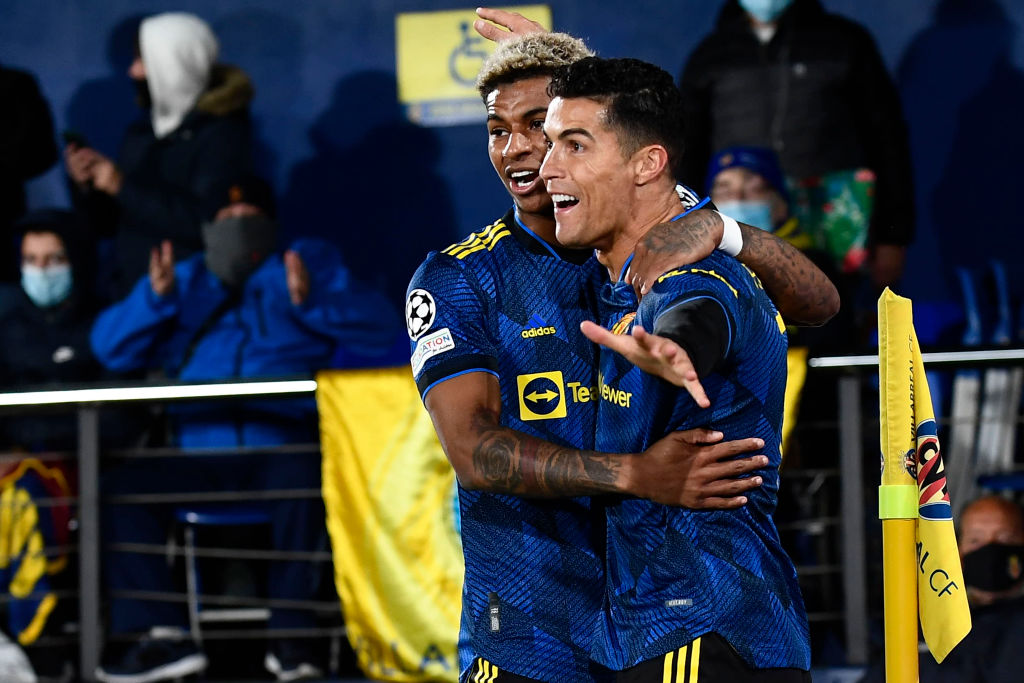
“People say he’s arrogant, but no: when you work hard, you’re actually very aware of your weaknesses. He doesn’t show them, but that doesn’t mean he doesn’t know. He’s very intelligent. Then, with a manager like Sir Alex, every year we achieved something, he wasn’t happy with it – he wanted more. That was the benchmark that was established for the rest of Cristiano’s career.”
Ronaldo tasted Champions League glory for the first time that season. After slotting a crucial spot-kick on the final day of the 2007/08 Premier League campaign as United retained their title at Wigan, he headed the Red Devils in front against Chelsea in Moscow. Petr Cech saved Ronaldo’s shootout penalty, but he was redeemed by John Terry’s slip.
“I thought we would lose when I missed – I thought it would be the worst day of my life,” revealed the Portuguese. “Now, it’s the happiest day of my life.”
The Ballon d’Or was his for the first time – as was FIFA’s best player honour, which had never previously gone to someone based outside Spain or Italy. Messi, yet to win either gong, was second in both votes.
😶 Ronaldo's miss💥 Hargreaves top bins😢 Terry's slip🙌 Van der Sar's saveIt's ten years to the day since that Champions League final between Chelsea and Manchester United... pic.twitter.com/DiVkILglqeMay 21, 2018
Ronaldo could have been based in Spain by the time he picked up those awards: Real Madrid were ready to meet the €75 million release clause in his contract, only for United to report them to FIFA. The clause had been confidential and they were furious someone had leaked it – Ferguson was angry too, with the way Madrid president Ramon Calderon constantly spoke about Ronaldo in the media.
“You can’t go this year,” the United supremo told his star man. “I’d rather shoot you than sell you to that guy now.”
So, a gentleman’s agreement was made: if a world-record fee was offered a year later, he’d be allowed to leave Old Trafford. Soon, sources claimed Real had agreed a deal with Ronaldo to sign him then, with a €30m break clause if either party backed out.
It didn’t stop him guiding United to another Champions League final in his last season at the club, mind – Ronaldo launched a 40-yard missile at Porto that was so good it scooped FIFA’s maiden Puskas Award. He also helped United to overhaul Liverpool and win a third league title in as many years, only for Pep Guardiola and Barcelona to ruin his fairytale ending in Rome. As well as deposing the Red Devils as European champions, Barça won five more trophies that year, as Messi began a four-year domination of the Ballon d’Or.
"Get me 1,000 roses"
Ronaldo joined Real in the summer of 2009 for a world-record £80m, with the €1 billion release clause a whopping cherry on top.
Florentino Perez had by then assumed the Bernabeu presidency, and some had advised him to back out of the deal, worried about its financial implications. Perez opted to plough on, though, with Barcelona and Manchester City ready to step in. If there’d been a chance that Ronaldo might end up playing under Pep, instead he was tasked with halting the domestic dominance of the Catalan coach. Sound familiar?
Ronaldo-mania quickly took hold in Madrid.
“The Bernabeu was full for his presentation – almost 100,000 people coming to see one player,” former team-mate Royston Drenthe recalls to FFT. “We hung out a lot, but he had to get used to how big he was in Spain. Some players could go to a nightclub, and they’d be bothered a bit by other people. If we went somewhere with Cris, it had to be organised in secret. We arranged our own parties with people we wanted to invite, as it was almost impossible to go to a club with him.
“He has no privacy in his life at all. It makes me angry if people say he’s arrogant. How do you know? You don’t know him. He’s almost never able to be himself, unless he displays some kind of arrogance to shield himself – otherwise he has to say ‘yes’ to everything and that’s impossible.
“He was always focused on the tiny details. I was in restaurants with him on team trips and sometimes plates of ham were served. All the players would eat, but he would only take one slice. The man is a winner – if you made a mistake in training, he’d say so. When you saw his work ethic, you knew he was doing it for himself, not for the sake of showing others.”
A post shared by FourFourTwo (@fourfourtwouk)
A photo posted by on
There was still time for some rest, though.
“He was quite a social person,” continues Drenthe. “One time we were sitting at the back of the team bus, when Ronaldo fell in love with [model] Irina Shayk. Cristiano was the one who was able to hook up with girls like her, Kim Kardashian and Paris Hilton, so already for us it was interesting to hear what he had to say! That day he was like, ‘I’m so in love with her, what should I do?’ One of us suggested, ‘Cris, just send her 1,000 roses’. I swear he looked up, looked at us, then said, ‘Yes, that’s what I’m going to do.’ Afterwards, he called one of his people and said, ‘Listen, send 1,000 roses to Irina Shayk’.” The pair dated for more than five years.
Ronaldo scored 26 league goals in his first season at Madrid, outshining fellow summer signing Kaka and helping the team amass a club-record 96 points. It still wasn’t enough: Messi scored 34 and Guardiola’s Barça won La Liga with 99 points. Perhaps taking advice he’d received from Usain Bolt a bit too literally (“I told him to be rougher and opponents will leave him alone”), Ronaldo was sent off twice that campaign, the second for breaking a defender’s nose.
In his second season, he began to feel more comfortable when Karim Benzema featured more regularly, in place of the more predatory Gonzalo Higuain. He netted 40 La Liga goals to pip Messi to the Pichichi prize, plundering 53 in all competitions.
“These stories people tell about Ronaldo and Messi battling each other, I lived them for three years,” says Jose Morais, part of the club’s coaching staff under Jose Mourinho, who replaced Manuel Pellegrini that season. “I never heard him say, ‘Man, I have to beat Messi,’ but he always wanted to be the best of the best. In Spain, who could give him a fight? Messi. They were in the same league, so it was easy to compare their numbers.
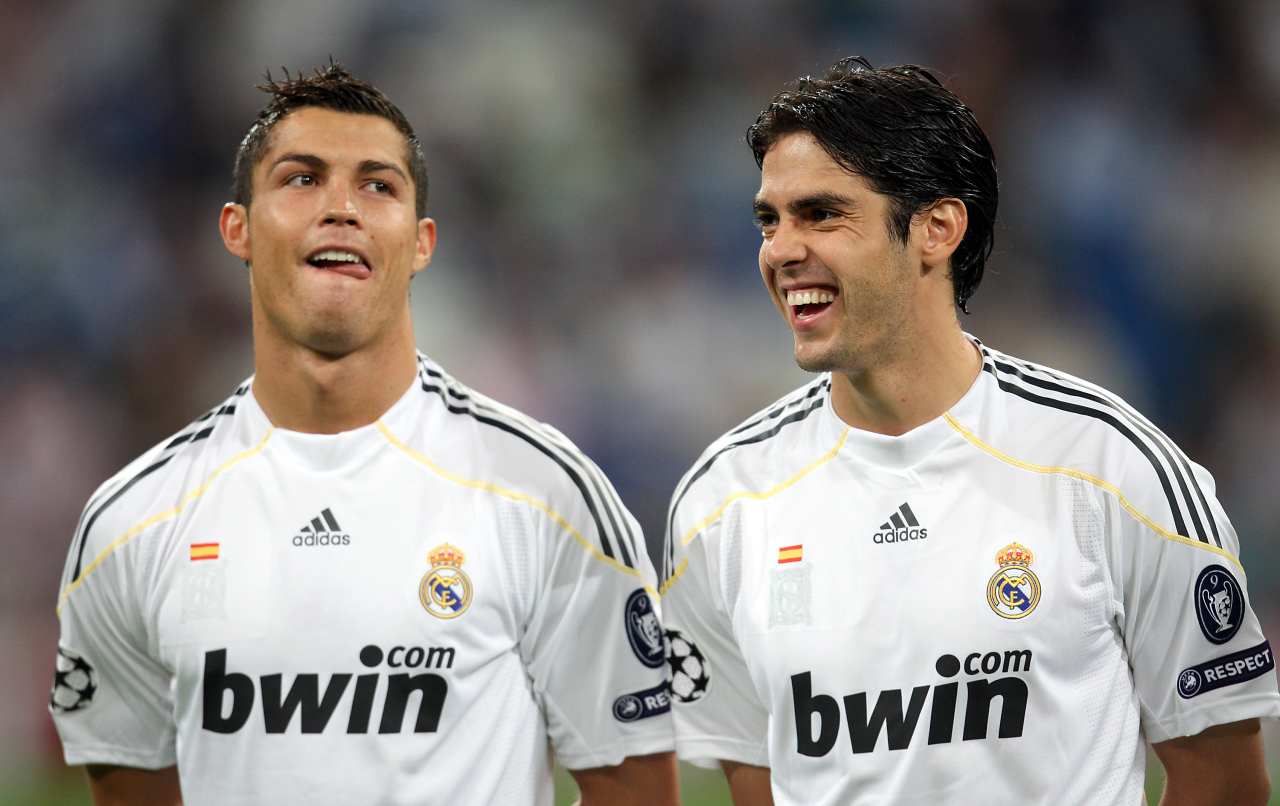
“It was a dynamic that Real took advantage of, because Cristiano is a born competitor. I’ve seen people say he’s a bad loser, but he’s fighting an inner fight; he’s fighting himself. If he scored 30 times in a season, he’d try to score 40 times in the next one – and it’s not like he sits and waits for that to happen. He works his ass off.
“If you pay attention to his in-game body language, you can see he demands a lot of himself. There are people that have negative dialogues inside their heads – not Cristiano. His inner voice is aggressive but in a positive way, saying, ‘F**k it, man, you are so much better than this – don’t give up, try again’.”
When things still don’t go well, frustration is the inevitable by-product. Mourinho’s first Clasico ended in a 5-0 defeat to a mesmeric Barça at the Camp Nou – Ronaldo shoved Guardiola on the touchline, sparking a mass scuffle. Barcelona would march to another league crown, but Ronaldo got his moment when he faced them again in the Copa del Rey final, jumping high to head home an extra-time winner.
“The goal in the final of the Copa del Rey was celebrated so much, because it broke the hegemony of Guardiola’s Barça,” former Real Madrid striker Fernando Morientes tells FFT. “Cristiano represented the leap in quality needed to rise to the occasion.”
Literally, in the case of that cup final. “The moment he jumped to head that ball, the game was over,” remembers Morais. “Only an extraordinary player such as Cristiano can score a goal like he did that night. We were able to take that first step in the direction of ending the Barça era.”
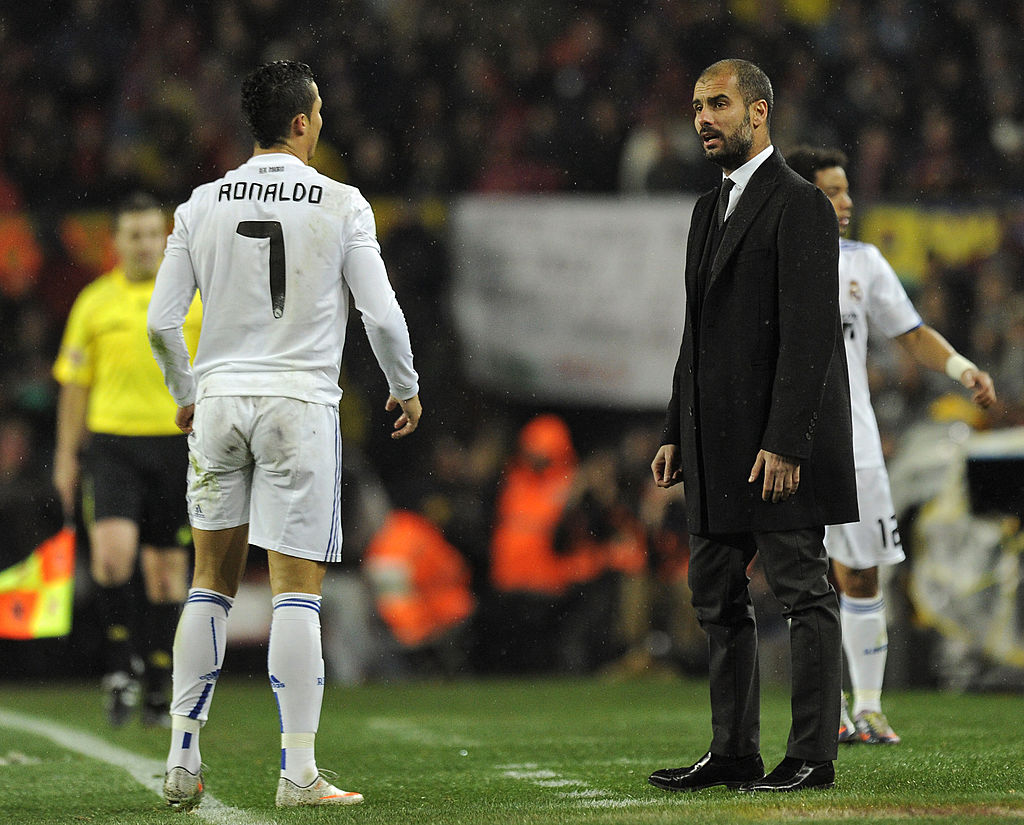
In 2011/12, Ronaldo halted the Blaugrana’s three-year winning streak in La Liga. Barça scored 114 goals, but Madrid replied with a record 121. Ronaldo smashed 46 of them, including a magnificent seven hat-tricks, as Los Blancos became the first side in La Liga history to accumulate 100 points.
It had taken a crazy level of performance to topple Guardiola’s side, but Ronaldo had continued driving himself and Real on until they achieved it.
“He was a player with so much personality and he’d carry the responsibility of the entire team,” says Morientes. “You expected good numbers from him, but not that he’d score more goals than the amount of games he’d played. Madrid went onto the pitch knowing they were winning 1-0.”
Ronaldo had struck a winner at the Camp Nou in late April, to effectively seal the title. Defeated and stressed, Guardiola announced a week later that he was leaving Barça at the end of the season.
The aborted comeback
That campaign was also the first meeting of Ronaldo and Raphael Varane, signed as an 18-year-old from Lens. Varane soon earned CR7’s respect by having the self-confidence to stand up for himself.
“Varane, go into the middle,” Ronaldo had instructed the teenager in a training match. “I’m not Varane, I’m Rapha,” the Frenchman shot back. Ronaldo was soon tipping him to become the best defender in the world.
In Mourinho’s final season, with tensions flaring between the manager and his senior stars, Ronaldo refused to celebrate two goals against Granada. “I’m sad and they know why inside the club,” was all he would say by way of explanation.
Delays over a new contract strained his relationship with Perez, and Ronaldo told the president he wanted to leave. “If you want to go, bring me enough money to sign Messi,” said Perez. It didn’t go down too well.
An Old Trafford return seemed on the cards. “Ferguson said, ‘I’m 99 per cent sure we will have Cristiano’,” Patrice Evra later claimed. “I spoke with Cristiano and he said he was coming to join United.”
Ronaldo faced United in the last 16 of the Champions League that term, again refusing to celebrate – this time out of respect – after sliding home the winner at Old Trafford. He’d returned to a hero’s reception.
“That game wasn’t a good memory for me, because I was unfairly sent off, but it was a really special moment for the club,” says Nani. “All the supporters welcomed Ronaldo back with open arms. When he entered the pitch, it was unbelievable to hear everybody singing for him.”
El día que @Cristiano Ronaldo marcó ante 'su' Manchester United 🙏⚽📆 ¡Fue #TalDíaComoHoy hace 8 años! ¡Cómo pasa el tiempo!#UCL | @realmadrid pic.twitter.com/yTUCf7WcWjMarch 5, 2021
Ultimately, it would prove to be Ferguson’s final Champions League fixture – although even after he announced his retirement, the board informed successor David Moyes that Ronaldo might still join that summer. In the end, the 28-year-old decided to sign a new deal with Real Madrid.
From there, Ronaldo embarked upon the most extraordinary period of his career. He finally won his second Ballon d’Or at the end of 2013, pipping Messi after hitting 69 goals for club and country in the calendar year, including a memorable hat-trick in a World Cup play-off showdown with Zlatan Ibrahimovic’s Sweden.
Another Ballon d’Or followed in 2014 after he’d led Real Madrid to La Decima, having scored twice in a 4-0 thrashing of Guardiola’s Bayern Munich in the semi-finals. He posted a career-best 61 goals in all competitions in 2014/15, including 48 in La Liga, but Barça won the title, Champions League and Copa del Rey as Perez replaced boss Carlo Ancelotti with Rafael Benitez. Ronaldo was less than impressed – Benitez never seemed to gain the Portuguese’s respect, particularly after appearing reluctant to declare Ronaldo the best player in the world in the media.
Mid-season replacement Zinedine Zidane fared better and Ronaldo swiftly won Ol’ Big Ears for a third time in 2016 – then a fourth, as he scored twice in a 4-1 final triumph over Juventus. The Ballon d’Or followed after both victories – finally he’d achieved his long-term aim to draw level with Messi, on five apiece.
Incredibly, though, he’d been whistled by a section of Real Madrid fans on the way to that latest Champions League success, early in a quarter-final against Bayern. “I don’t know who doubts Cristiano, the numbers don’t lie,” he third-personned after. He responded by scoring a hat-trick. There’s long been a sense that much of Ronaldo’s motivation is built on anger; the need to find a (real or imaginary) slight and emphatically prove someone wrong.
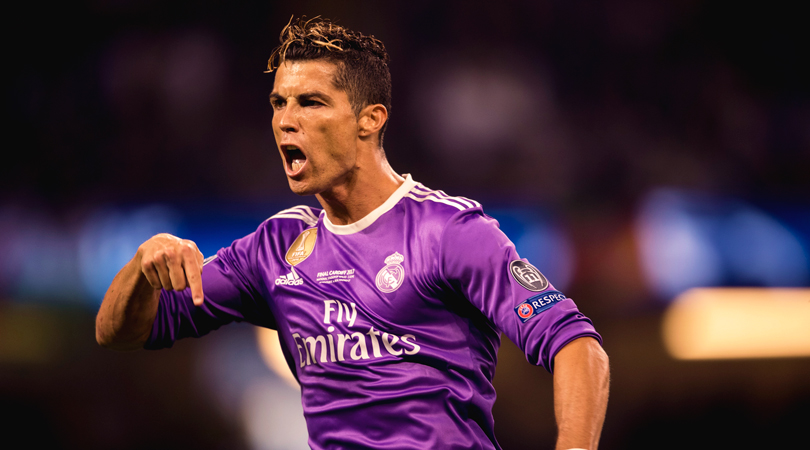
Off the field, though, the forward was being investigated by Las Vegas police over a rape allegation dating back to 2009 – one he firmly denied. The investigation eventually came to an end without any charges being brought, after the prosecutors said the claims could not “be proven beyond reasonable doubt”. Separately, Ronaldo was one of a number of footballers charged by Spanish authorities with tax evasion, for which he was handed a suspended jail sentence.
In 2018, he helped Real Madrid to a historic third successive Champions League, his fifth triumph in the competition. Only Paco Gento has won it more.
“They should call it the CR7 Champions League,” he smiled, knowing victory against Liverpool was his final game for the club. His relationship with Perez had broken down.
“I felt inside the club, especially from the president, that they no longer considered me the same way,” he later explained. “I was no longer indispensable, so that made me think about leaving Madrid.”
It was a surprising end to a glorious era – that summer, Ronaldo was allowed to join Juventus for €100m. “I didn’t understand his departure,” laments Morientes. “A guy who scored so many goals was almost impossible to replace. He had years of football left at an extraordinary level – I wouldn’t have swapped that €100m for two or three more years of Cristiano. They wouldn’t have won all those Champions Leagues without him.
“The moment Cristiano arrived was when the club really started to dream big.”
Sarri seems to be the hardest word
Instead, it was the Old Lady’s turn to dream. Ronaldo wowed them months earlier when he scored a stunning overhead kick against Juve in a Champions League quarter-final, earning a standing ovation from home fans at the Allianz Stadium.
The Serie A heavyweights hankered after a first Champions League trophy since 1996, but had continually fallen short.
“Juventus signed him because they’d twice reached the Champions League final in the previous four years – the first time they were killed by Messi, and the second by Ronaldo,” explains Paolo Condo, a respected journalist for Italian TV network Sky Sport. “They felt if they signed one of those monsters, they’d surely win the Champions League.”
The transfer wasn’t without controversy – employees at a Fiat factory in Italy went on strike after the Agnelli family, who own both Juve and the car company, opted to spend big on Ronaldo while Fiat were cutting costs. The club were already on course for an eighth successive Serie A crown when they hosted Atletico Madrid in the last 16, trailing 2-0 from the first leg. Ronaldo hit a hat-trick.
“He won that match all on his own,” recalls Condo. “In that moment, a lot of us thought signing him could be a good deal. But in the quarter-finals, the fantastic style of Ajax left Juventus without an answer.
⚪️⚫️ Cristiano Ronaldo has now scored 56 hat-tricks for club & country 🔥#UCL | @juventusfcen pic.twitter.com/kk46MfQHVZJanuary 6, 2020
“The destiny of the deal was written that night, because they decided to change the coach, Massimiliano Allegri, and try to find a new way with Maurizio Sarri. It was a big mistake, as Sarri didn’t have the pedigree to train players like Ronaldo.
“If you look at his history, he was a great player under Sir Alex Ferguson, Carlo Ancelotti and Zinedine Zidane – people he respected. He didn’t have great seasons under Rafa Benitez or Manuel Pellegrini. Or with Sarri.”
That wasn’t for a lack of trying on Sarri’s part. His first act was to meet Ronaldo on the player’s yacht on the French Riviera, but he failed in an attempt to persuade him to switch position from the left flank.
“Every year, coaches had tried to convince him to play centre-forward, because Ronaldo didn’t help when you didn’t have the ball,” says Condo. “Sarri could accept it, but then Ronaldo must play centre-forward to balance the team. Ronaldo said no. He’d produced the best form of his life when Benzema was upfront for Real Madrid, so he always tried to repeat that tactical situation.”
Ronaldo was Juve’s top goalscorer in his first Serie A season, netting 21 times, but the team actually fell 16 goals short of the 86 they’d registered a year earlier. Paulo Dybala’s tally had dropped from 22 to five. “Dybala was demolished – they brought in Ronaldo and it was a bomb over him,” says Condo. “Juventus didn’t score more goals, the difference was that Ronaldo scored all the goals. Set-pieces are the easiest way to understand what he gives you and what he doesn’t. Before he arrived, you had two great specialists in Miralem Pjanic and Dybala, and every year they combined to score seven or eight goals. In three years with Ronaldo, he took all the set-pieces and scored only one.
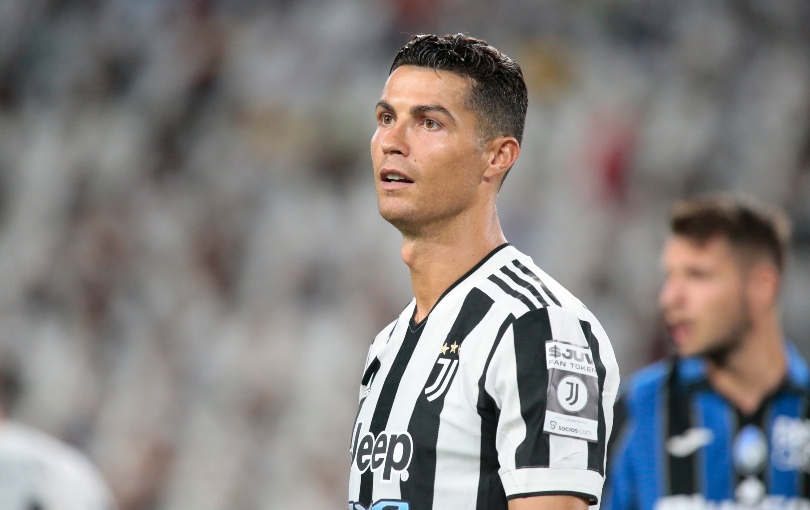
“Ronaldo was not enough, and he realised very quickly that he was not enough. He was like the nice lady whose best days are behind her, and remembers when she had other men who were better than you. At Juve, you could always read in his eyes that it wasn’t like Real Madrid.”
Juventus won Serie A again under Sarri and Ronaldo upped his tally to 31 league goals, an impressive number in Italian football. He was named the league’s standout player for a second successive campaign.
But it was the club’s narrowest margin of victory in nine years – just a point over Inter – and two Ronaldo goals weren’t enough to stop them losing to Lyon in the last 16 of the Champions League. European triumph was getting further away, not closer.
The Bianconeri replaced Sarri with Andrea Pirlo, hoping that appointing a legendary former player might work in the same way as Ronaldo’s relationship with Zidane at Real. But Pirlo’s lack of experience was quickly exposed – he’d only been appointed boss of the club’s under-23s nine days before he was surprisingly handed the first-team job.
Ronaldo scored twice as Juventus won 3-0 at Messi’s Barça in the Champions League, but they went out in the last 16 once again – this time to Porto – and collapsed to fourth in Serie A. The money spent on Ronaldo had hampered their ability to fix the rest of the team, and the Old Lady’s declining financial position led them towards the desperate plan for the European Super League. The teams who have been clinging on to the wreckage of that sinking ship – Juventus, Real Madrid and Barcelona – are those who have been paying gargantuan salaries to Ronaldo and Messi in recent years.
Different target, same result for @Cristiano 🔥(via @juventusfc)pic.twitter.com/kFi5nkN0tqMay 25, 2020
“You had Ronaldo but you no longer had a team,” says Condo. “In the 2015 Champions League Final, the Juventus midfield was Pirlo, Paul Pogba, Claudio Marchisio and Arturo Vidal. A fantastic midfield. Last season it was Arthur, Adrien Rabiot, Aaron Ramsey, who’s constantly injured, and Rodrigo Bentancur. There are three classes of difference between those midfields.”
Despite the team’s demise, Ronaldo still notched 29 times in Serie A, beating Romelu Lukaku to win the league’s Capocannoniere top scorer award. “I reached a target I set myself since the first day I got to Italy: to win the league, the cup and the Super Cup, and also to be the best player and the top scorer,” Ronaldo said on Instagram. “Thanks to everyone who took part in this journey.”
The not-so-hidden message was clear: he was ready for the journey to end. Some view that journey more positively than others.
“I think overall it was a positive experience for Ronaldo and our football in Italy,” ex-Juve midfielder Angelo Di Livio explains to FFT. “He possibly expected more in Europe, but he was so professional and a marvellous example for many youngsters.
“He was a perfect goal machine. I’m sorry his time at Juventus ended so quietly.”
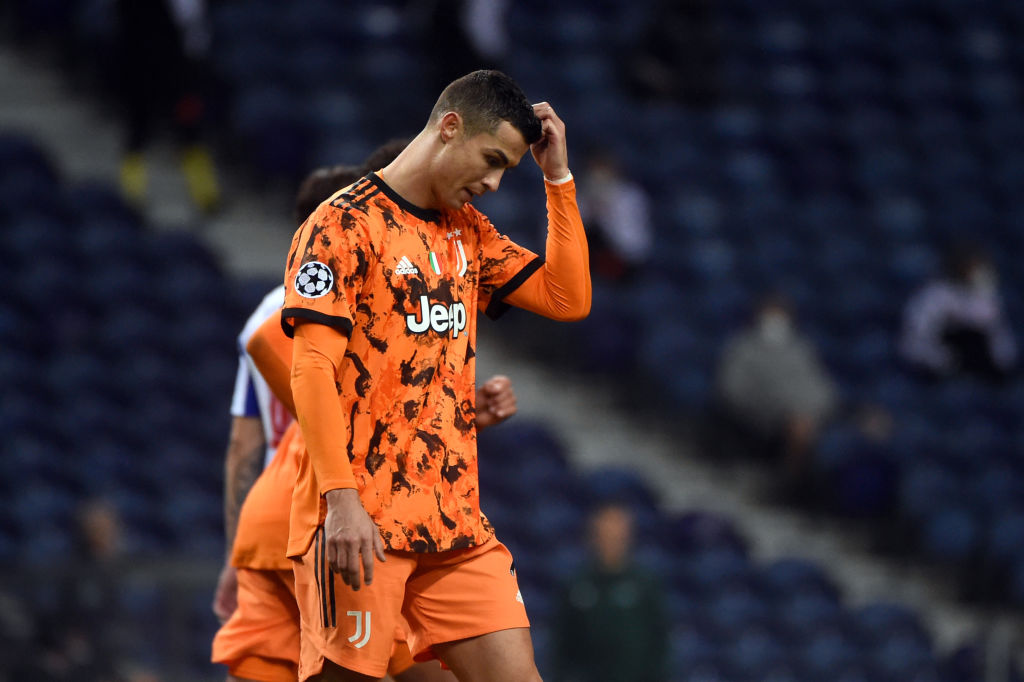
“Cristiano did some amazing things,” says Massimo Carrera, Juve’s assistant manager during Antonio Conte’s spell in charge. “Just look at the numbers: 101 goals in 134 games. When the team were struggling, he always managed to do something important. The problem is you can’t win by yourself. The team was rebuilding – they’d lost Gianluigi Buffon, Andrea Barzagli and Andrea Pirlo, and they didn’t manage to build a team to fit his standards.
“He carried Juventus. He’s still incredibly fit, he has the body of a 20-year-old – actually, there are some 20-year-olds who don’t have his physique. He could play until he’s 40. He’ll definitely be missed.”
Not just on the pitch, either. Two days after his departure, the club lost 200,000 followers on Instagram. Just like his time in Madrid, CR7’s Italian job came to a sudden end: with the player eager to leave before his contract expired, and the club willing to accept a low transfer fee – less than £13m. Despite all of the goals, Juventus wanted his wages gone.
Ronaldo vs Pep: The rematch
For a while, the 36-year-old’s destination appeared to be Manchester City, before the red half of the city, horrified at the prospect of him joining their rivals, rapidly mobilised and ensured he returned to Old Trafford.
“I haven’t had a chat with him, but I think Manchester City was a bluff,” suggests Nani, wondering whether those talks were just an attempt to bring United to the table. “I don’t think Cristiano at City would have worked – Manchester would have burned!”
The Red Devils hope this proves to be more of a Robin van Persie signing than an Alexis Sanchez. Both snubbed City to join United – the former helped them to win the league, the latter scored just three Premier League goals, weighed down by Ronaldo’s old shirt.
During his 12 years away, CR7 netted 392 league goals, while United’s various No.7s amassed only 24. Ronaldo could match that tally this campaign alone and seems a more natural fit for United than Guardiola’s City, where the focus is on the system rather than the individual. At the Etihad, no one is bigger than the collective.
The link-up with Bruno Fernandes could be pivotal – Ronaldo’s international team-mate persuaded him to return to English shores, even if Fernandes was dropped by Portugal during Euro 2020 and has struggled to shine in the same way alongside the tournament’s Golden Boot winner. Bruno was substituted at 1-0 down on the night that Ronaldo broke the international goalscoring record recently, heading his 110th and 111th Portugal goals against the Republic of Ireland.
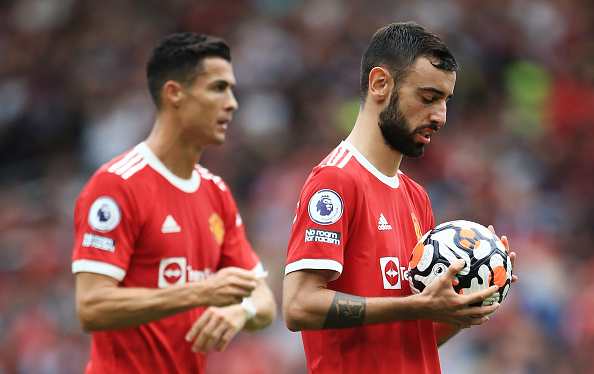
It took his tally for club and country to an astonishing 785, though managing Ronaldo while getting the best out of the rest of his squad will be a test like Ole Gunnar Solskjaer has never faced before.
“Ronaldo needs a boss who has a human touch, a person who acknowledges the good things he does, but also sticks by his side if he’s not doing well,” says ex-Real assistant Jose Morais. “The most successful at handling him were those who found the best balance between those two things.”
Get it right, and United could be serious title contenders, for the first time in years.
“There needs to be a team around him, but with Ronaldo, Manchester United can reach the same level as when Sir Alex Ferguson was there,” says former Juve assistant Carrera.
He may not be the same marauding player to grace Old Trafford in his original spell, but Ronaldo’s extraordinary fitness regime has extended his career. He’s older than Wayne Rooney, for example, who retired in January.
“There were times when Juve rested him, but I don’t think he needs it,” insists Morais. “I remember times at Real Madrid when we wanted to give him some rest and leave him out of a game. He was like, ‘No way, I want to play this one too!’
“It happened in a match against Murcia – he was sat on the bench and came on at half-time. What happened? He scored and was the happiest man in the world. This was a Copa del Rey tie, but he was adamant that he wanted to play. He’s still in the condition to play whenever he wants. The day he needs rest, that’s the day he’ll retire.”
One suspects that before finally hanging up his boots, he hasn’t completely given up on collecting one last Ballon d’Or. Messi has edged ahead of him, with six to Ronaldo’s five, though the Argentine now plays in a less illustrious league for Paris Saint-Germain, reversing last season’s situation.
“I’m the Italian juror for the Ballon d’Or, and I always vote for a player that’s won something of importance that year,” admits Condo. “If Manchester United were to win the Champions League with a goal from Ronaldo, he’ll be a leading candidate. But if Manchester United finish third in the Premier League and only reach the last eight of the Champions League, I will never vote for him – even if he scores 100 goals.”
Ronaldo is acutely aware of that fact. It’s not enough to just score – he needs only 14 goals to match the highest Premier League tally for a player over the age of 35, posted by Chelsea’s Gianfranco Zola in 2002/03. He has to help United win trophies again, and he’ll do everything in his power to make that happen; to reverse the power shift since he left Manchester in 2009.
“When United lost a player like Cristiano and a manager like Sir Alex Ferguson, it was huge,” says Louis Saha. “Ronaldo symbolised the club’s attacking mentality. Sir Alex had always said he wanted people with courage, not someone who only brings goals when we were already 2-0 up. We needed them to perform when the team was struggling. Cristiano did that.
“Sometimes over recent years at United, I wasn’t seeing enough character, enough reaction that players were really gutted when they missed opportunities. No one was telling them, ‘You need to do much better,’ like Roy Keane, Gary Neville or Rio Ferdinand used to. Cristiano will do that – you need goalscorers, but you also need leaders.
“He’s still one of the best players in world football. Yes, he’s 36, but he’s the best finisher by far – he’s been top scorer in Italy. I don’t think Juventus’ style was that creative – he’ll have more chances in England.
“At the end of the season, he wants to be the best player with the most trophies. They have signed him to win the Premier League. If he could win the title back for Manchester United, it would be amazing for him. That’s what he’s looking for – he’s obsessed with winning. I can only see one outcome here.”
Time will tell whether Saha is right. Ronaldo brought an end to one era of Pep Guardiola dominance during his time at Real Madrid. Having snubbed the Catalan’s advances this summer, now he aims to do it again, with the team of his heart.
Manchester United were the club that took Cristiano Ronaldo to the top. If he can take them back there, his legacy will be complete.
Subscribe to FourFourTwo today and save over a third on standard price.
Restock your kit bag with the best deals for footballers on Amazon right now
ALSO READ
LIST Football Manager 2022: All the FM22 wonderkids you'll need to sign
RANKED! The 50 best managers in the world
QUIZ Can you guess 50 correct answers in FourFourTwo's Big 2021 quiz?

Chris joined FourFourTwo in 2015 and has reported from 20 countries, in places as varied as Jerusalem and the Arctic Circle. He's interviewed Pele, Zlatan and Santa Claus (it's a long story), as well as covering the World Cup, Euro 2020 and the Clasico. He previously spent 10 years as a newspaper journalist, and completed the 92 in 2017.
